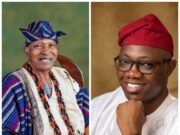Ambali Adetunji, younger brother of Oba Saliu Adetunji, is dead. His death coming less than four months after the demise of his brother.
OYOINSIGHT.COM learnt that he died on Tuesday at 84 and was buried same day, according to Islamic rites at his Odo-Oba, Boluwaji, Ibadan house.
He was survived by wives and children.
Ambali, between the 1980s and the last decade, together with the late Oba Adetunji redefined the face of Fuji music, picking the great Wasiu Ayinde Marshal, K1, from the gutters and making him easily the most consequential Fuji artiste, not just of his generation but in history. Sule Alao Malaika, the skinny youngster who emerged from Isale-Eko in the 1990s, also found fame and wealth through Babalaje Records.
”Alhaji Ambali was actually the one managing the record labels. Oba Adetunji was the one putting money into it. The company lifted many up-and-coming artistes to the big stage. Popular fuji musician, Wasiu Ayinde, is one of them. And that is what he referred to Alhaji Ambali as Oga wa. Through the recording company, they also helped Salami Balogun, Amuda Agboluaje, Tatalo Alamu, Raimi Atolagbe, Iyanda Sawaba and Asanat Omo Aje to stardom,” a family source who did not want names mentioned told OYOINSIGHT.COM.
Of the four children that his mother had, Ambali and his brother, Oba Saliu Adetubji were the surviving ones.
Ambali, who was the Aare Musulumi of Odo-Oba in Ibadan, and who was overseeing the music recording business of his brother, had in one of his interviews with The Punch, when his late brother was becoming the king, said Adetunji had a humble beginning, starting as traditional attire (aso ofi) weaver, a tailor and later a music promoter.
Said he: “In those days, my brother was a tailor and traditional attire weaver. He was also a renowned trader who later ventured into music promotion. In Nigeria today, he is a leader in the music industry.
“People like the late Isola Abioro, Ogo Oluwa Records and so on met him in the business. Because he is not greedy and because of the respect he has for his colleagues in the business, he does not snatch musicians from them. For that reason, he is highly regarded by musicians and other promoters.
“Our mother was a daughter of the former Balogun of Apomu. Our father was an Ibadan indigene who loved music just like Adetunji and he was revered in the city. Our father had many children and many wives but our mother had four, although only two of us are still alive.”
Ambali noted that the journey of his brother to the royal stool began unwillingly in 1976 during the reign of Olubadan Gbadamosi Adebimpe, when he was compelled to accept the leadership stool of the Alusekere compound. Incidentally, the late Omiyale, whose death last year moved Adetunji to the position of Balogun and next Olubadan, was the man who noticed the leadership quality in the new Olubadan and persuaded him to become Mogaji.
Ambali said, “Despite his philanthropic gestures towards Ibadan indigenes and contribution to the development of the city at early age, Adetunji was not desperate to assume any of the traditional leadership position in Ibadan. He preferred to remain anonymous but he was like a gold fish that has no hiding place.
“I remember the late Omiyale telling him that even without being a traditional chief, he was already playing the role of a community leader. It was a long walk to the top but a wait that was worth the pain,” Ambali explained.
“My brother is a gentleman and this is a trait he has been demonstrating from childhood. From what I have observed of him, he is a complete gentleman and a philanthropist. He ensures that no one suffers or lacks any good thing around him. We have had stories of my brother borrowing money to pay debts of others, even those who are not his relatives. In the past, Ibadan artistes were not recognised. When he became a promoter, he lifted they and other Yoruba musicians and empowered them professionally. Among the musicians he helped are Alhaji Tatalo Alamu, Dauda Epo Akara, Wasiu Ayinde and Malaika.
“He is still doing that. When he moved to Lagos, several decades ago, he brought a lot of budding musicians to the limelight. He also went to Ghana to promote their music and propagate the course of lifting Ibadanland. My brother is always passionate about issues that concern Ibadan,” he said.



































